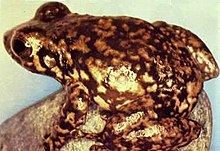Web-footed coqui
| Web-footed coqui | |
|---|---|
 |
|
| Scientific classification | |
| Kingdom: | Animalia |
| Phylum: | Chordata |
| Class: | Amphibia |
| Order: | Anura |
| Superfamily: | Hyloidea |
| Family: | Eleutherodactylidae |
| Genus: | Eleutherodactylus |
| Subgenus: | Eleutherodactylus |
| Species: | E. karlschmidti |
| Binomial name | |
|
Eleutherodactylus karlschmidti Grant, 1931 |
|
| Frog Call | |
|
|
The web-footed coqui (Eleutherodactylus karlschmidti), also known as Karl's robber frog, is a possibly extinct Puerto Rican frog species of coquí.
It was first described by Chapman Grant in 1931, and was named after herpetologist Karl Patterson Schmidt. It is one of the largest coquí species, and the second-largest frog (behind Bufo marinus) on Puerto Rico, with a length of about 80 mm for females. Little information about its ecology and life history is available. It is nocturnal. The call is loud and sonorous. The eggs are laid in clefts or on rocks.
This semiaquatic, web-footed coquí is one of the few coquí species which have membranes between their toes, but is (or was) the only species which was fully webbed.
The web-footed coquí was endemic to the mountain streams and waterfalls in the Caribbean National Forest and El Verde cloud forest in the southeastern Puerto Rico. It was last observed in 1974, and is possibly extinct due to the fungal disease chytridiomycosis caused by the chytrid fungus Batrachochytrium dendrobatidis.
...
Wikipedia

